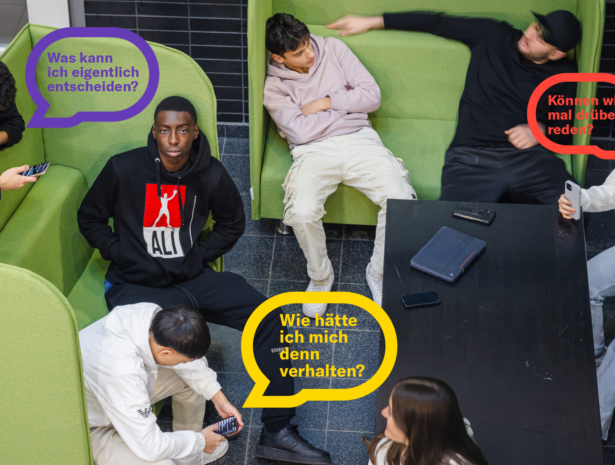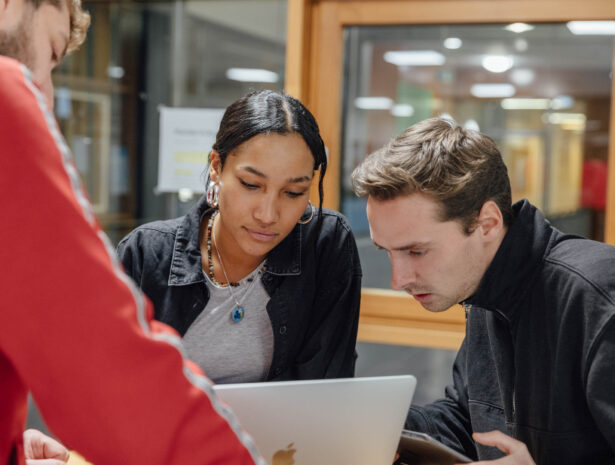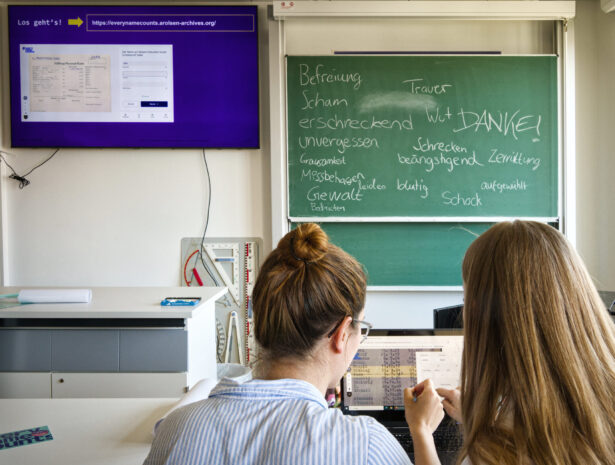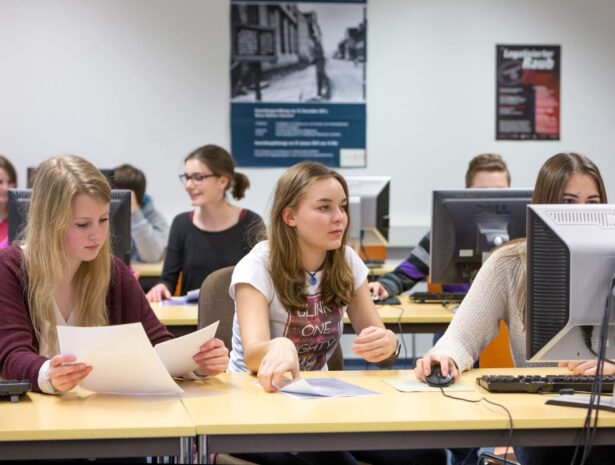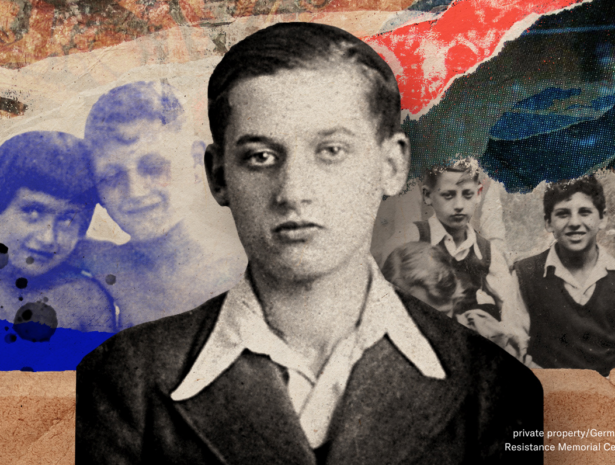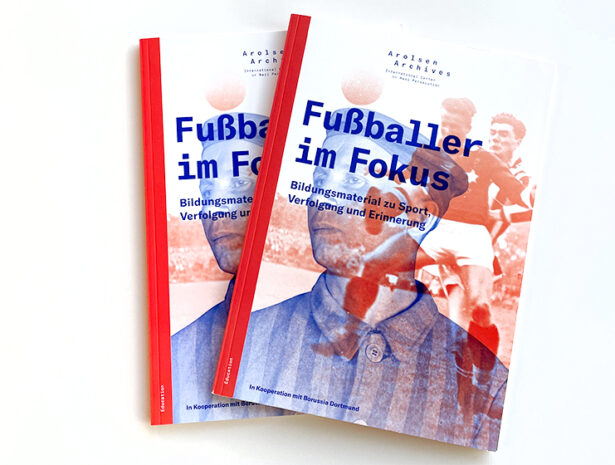Digital learning resources for young people

Teenagers and young adults want new, contemporary approaches to learning about history, so providing contemporary and dynamic digital learning resources is the primary focus of our activities in the field of education.
One of the findings to come out of our study “How does Gen Z think about the Nazi era?” is that young people are more interested in the Nazi era than their parents. However, younger generations do not see the crimes of the National Socialists in isolation from problems that face society today, such as racism and discrimination. Relating history to their own everyday lives is important to them. They expect new, digital formats and are keen to explore the past in their own way and share their thoughts in an open atmosphere. Our educational work is built on these foundations.
Digital education hub “and today?”
Our new digital education hub “and today?” is a modular, interactive learning environment. In this freely accessible web app, you will find a growing range of digital applications (mini games) that focus on the history of the Nazi era and on issues of social participation and marginalization since 1945.
In order to make sure that our educational resources are aligned as closely as possible with the circumstances of young people’s lives and with their digital habits and learning situations today, we involve pupils in their design and further development.
In addition to the education hub, we also provide a wide variety of other learning resources – ranging from conventional booklets with a focus on specific issues to collections of documents and smartphone apps.
Shaping an active culture of remembrance
The aim of our educational initiatives is to find attractive ways of teaching about historical events and provide inspiration for an active culture of remembrance. The educational resources we present here promote young people’s historical awareness and enable them to form opinions on social issues by engaging with history. We follow the Recommendations of the International Holocaust Remembrance Alliance (IHRA).
Find out more about our historical-political educational resources – they are suitable for regular lessons, project weeks, and cover lessons.
Get in touch with us:

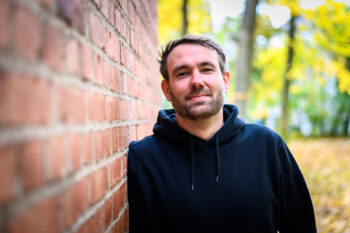
FAQ
Our digital education hub “and today?” features interactive mini games and includes a guide and supplementary materials for your lessons. The range of available resources is growing all the time. If you would like your school to get involved in the further development of “and today?” please contact us. We hold regular workshops to involve young people in the process.
We offer digital office hours for teachers and for people involved in historical and political education on every 1st Thursday of the month. Please register in advance, and remember to click the check box for English if that is your preferred language.
The Arolsen Archives also hold lectures and training courses that provide inspiration and new ideas for lessons in all subjects.
As the number of contemporary witnesses able to give personal accounts of Nazi crimes from their own experience dwindles, responsibility for promoting an active culture of remembrance and for sharing knowledge about Nazi crimes increasingly falls to archives.
Thanks to our study “How does Gen Z think about the Nazi era,” we know that young people are more interested in Nazi history than other generations. However, they want to explore the past in their own way and in relation to their own lives.
In cooperation with schools and with the help of feedback shared with us by pupils and teachers during our test and participatory workshops, we continue to develop our educational resources on an ongoing basis.
The Arolsen Archives currently cooperate with numerous schools, universities, and non-formal education institutions. In our experience, cooperative partnerships enrich political and historical education. If you are interested in working with us, please contact us.
As of May 23, 2024, you and your students will have full access to our new digital educational resource “and today?” which will be available free of charge.
Our crowdsourcing initiative #everynamecounts gives you and your class the opportunity to help build the world’s largest digital memorial. Students digitize the names and other data of victims and survivors of Nazi persecution. In doing so, they are actively engaging with the past – and standing up for respect, diversity, and democracy today.
You can also search our online archive, of course. It provides public access to many millions of documents about victims of Nazi persecution and displaced persons. We recommend you use our e-Guide to help you. This user-friendly tool provides a wealth of information on the most important types of documents in the archive. This approach is suitable if you are researching Nazi persecution in your own town or city, for example.
Are you planning a school trip to Berlin? Try taking one of our interactive tours – all you need is a smartphone. Five multimedia walking tours take participants to places where Jewish life took place in Berlin and tell the stories of schoolchildren in the Nazi era. This educational resource can be accessed in the ad-free berlinHistory app free of charge.
And if you would like to use our printed booklets and collections of documents to help you design your own teaching units, we will be happy to send them to you.
We also publish content tailored to the needs and interests of our target audiences on the social media platforms YouTube, Instagram and Tiktok.
Yes, you are welcome to use the documents from our archives. Try out our online archive, which provides public access to many millions of documents about victims of Nazi persecution and displaced persons. Or use our documentED document collection, which contains learning packages for trips to various concentration camp memorial sites in Europe. Alternatively, you can fall back on our ready-made educational materials, such as our booklet on “Football Players in Focus,” which also contains a large number of documents.

